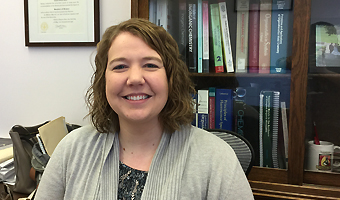By Ling Xin
NQPI editorial intern
Dr. Jessica White, Assistant Professor of Chemistry & Biochemistry, shared her latest research results on transition metal complexes in a talk as part of the Nanoscale and Quantum Phenomena Institute seminar series on April 18.
White’s group has been focusing on the preparation of new transition metal compounds that contain ruthenium and manganese and could be used to treat cancer or bacterial infections in the future. With the help of a visible light source, both metals have been shown to be effective in producing molecules that can kill cancer cells in the human body. Although researchers knew about these mechanisms previously, White’s lab is among the first to combine the strengths of the two.
“Ruthenium complexes are good at absorbing light and transferring the light energy to oxygen to form singlet oxygen (a toxic form of the oxygen molecule). Manganese complexes are good at carrying carbon monoxide molecules and releasing them when they absorb light,” she explained. “And singlet oxygen and carbon monoxide have both been shown to be effective in killing cancer cells and bacterial cells.”
The use of a light source to activate the compounds offers a relatively noninvasive and highly controllable method to kill cancer cells while leaving the healthy ones unharmed. “The novelty of our research is combining the two aspects to a single molecule so that we can attack cancer cells through more than one mechanism,” she added.
White said her lab is ultimately aimed at understanding the fundamental photochemical reactions that occur when compounds absorb light, as well as making compounds that can cause more than one type of biologically relevant reaction with the control of light.
Talking about her three years in Athens, White, who joined Ohio University in the fall of 2016, said she enjoyed her work here enormously. “It’s been great. I have a really good group of students. I have three doctoral students right now, and they are very hardworking. I also have outstanding undergraduates working in my lab. The department has always been supportive, especially to the junior faculty.”



















Comments